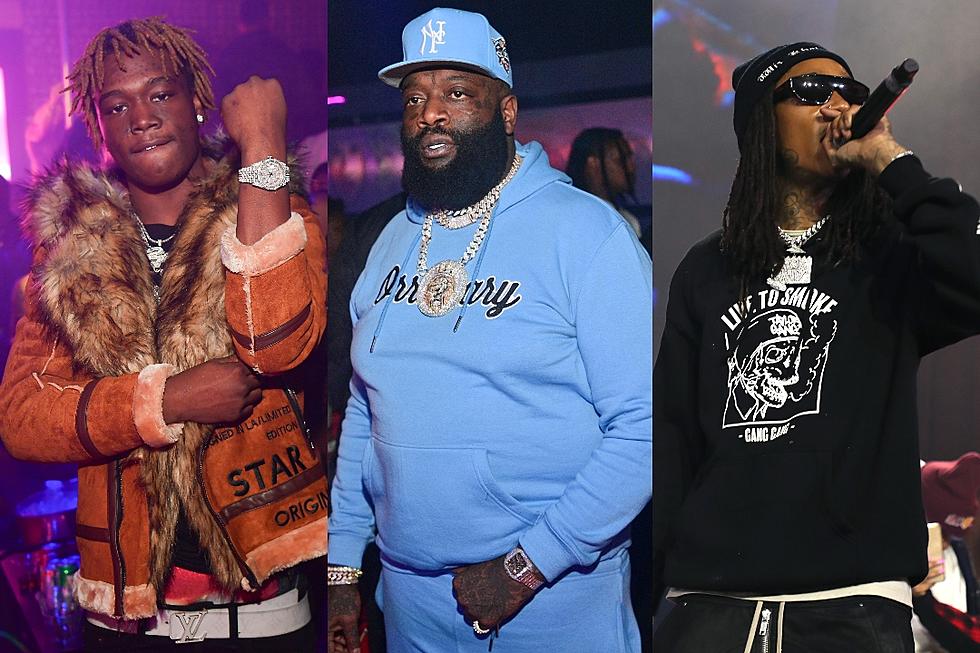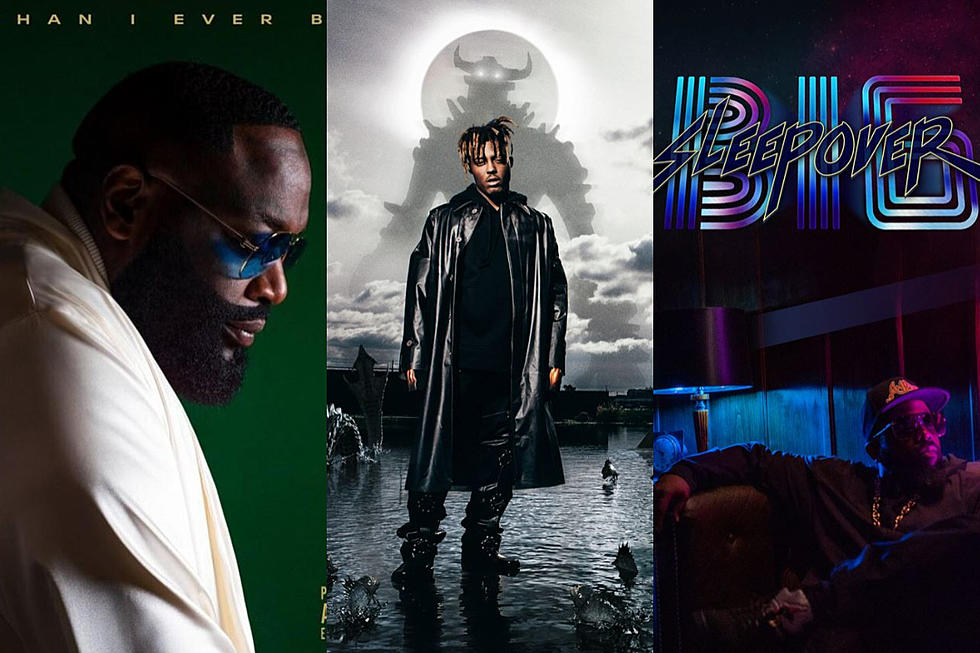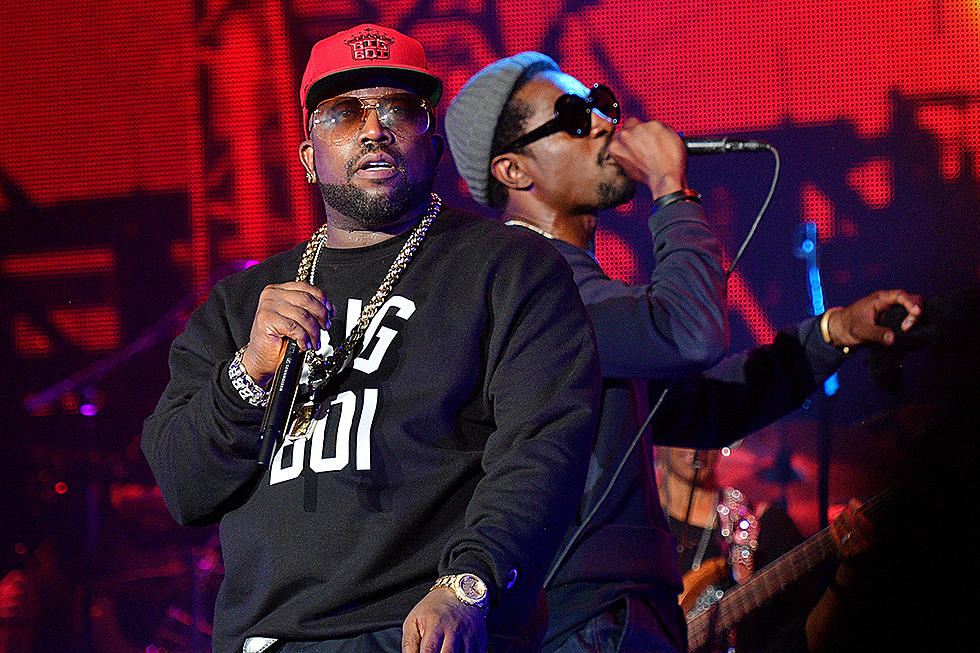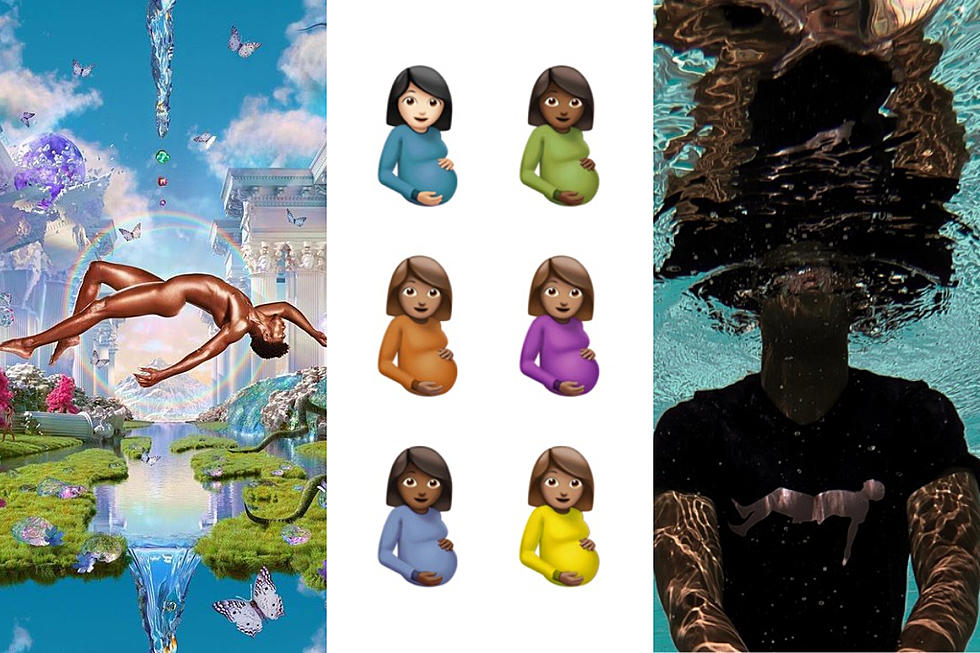
The South Got Something to Say: The Rise, Fall and Rebirth of Atlanta’s Dungeon Family
On August 3, 1995, amid rising tensions between Sean “Diddy” Combs’ burgeoning Bad Boy empire and Suge Knight’s menacing collective of Death Row inmates, literal outcasts André “André 3000” Benjamin and Antwan “Big Boi” Patton had the audacity to desecrate New York soil by winning Best New Rap Group at the second annual Source Awards.
Undeterred by the chorus of boos that tainted their victory, the defiant East Point Atlanta duo stormed the Madison Square Garden stage and surveyed their hostile surroundings. Then, springing into action like a tag-team wrestler, Big Boi stepped to the side and challenged his partner-in-crime to address their detractors: “So what’s up, Dre?” This prompted his cohort to lean into the mic and unleash a rallying cry that would sow the seeds for the South’s inevitable reign. “But it’s like this though!” he barked. “The South got something to say!”
In the years that followed, the same region that was once admonished for its unwelcomed contributions to hip-hop folklore somehow has become its unlikely epicenter. Much to the chagrin of its elder statesmen, today rappers like Future, 21 Savage, and T.I. dominate the charts while their sound, style, and slang are emulated throughout the entire music industry. A far cry from quips like “New York must stop biting and start writing/ And start malice when the hell we start bouncing?” from Dipset figurehead Cam’ron on his Harlem-charged street anthem “Let Me Know.” But while it’s difficult to pinpoint exactly when it was that Southern Hip-Hop seeped into the collective consciousness of the rap industry and asserted its dominance, only one crew can lay claim to putting Atlanta on the map: The legendary Dungeon Family.
Myintrotoletuknow
The Dungeon Family tree is an intricate labyrinth of leaves (such as Janelle Monae, Killer Mike, and Future), roots (OutKast, Goodie Mob, Big Rube, and others), and branches (Cool Breeze, Backbone, and Witchdoctor). But the trunk of the tree, it’s backbone and very foundation, is comprised of Rico Wade, Ray Murray, and Sleepy Brown. Collectively known as super producers Organized Noize. In fact, as Big Boi affirms in the eye-opening documentary The Art of Organized Noize, “From them cultivating and molding us, and for us to grow and be who we are today, it’s because of them.”
As the architects of The Dungeon Family’s signature sonic template, Organized Noize paired traditional boom-bap snares with live instrumentation, obscure samples, and otherworldly musicianship in order to diversify the redundancy in hip-hop’s portfolio. This infusion of soul defied conventions and introduced much-needed warmth and depth to the musical landscape. “The intricate part of Organized Noize,” Ray notes, “is knowing how to trust your partner.”
The partners in question would converge in 1987. When once upon a time, Ray relocated from the southwest Atlanta suburb of Sylvan Hills to Big Gipps’s Greenbriar neighborhood in East Point Atlanta. Already an adept beatsmith at such a young age, Ray piqued Gipp’s curiosities with his penchant for graffiti and willingness to teach his new neighbor how to rhyme. This crash course in hip-hop utility would prove fruitful, as they’d go on to join forces and proceed to pound the pavement as the promising duo Sixth Sense.
Elsewhere, T-Boz of TLC introduced aspiring artist Sleepy Brown to his future manager Rico Wade, which would then lead to a chance encounter with Ray at a recording studio. Blown away by Ray’s worth ethic and his natural aptitude for crafting songs, Sleepy implored Rico to recruit him into the fold. And in what can only be deemed as fate, Rico was precisely able to do that since Sixth Sense had fallen out of favor with their manager and were floundering around as free agents. Organized Noize was officially in business.
Git Up, Git Out
If the coming of age fan-favorite film ATL is any indication, roller rink culture was kind of a big deal in Atlanta. Enter Jelly Bean — the preferred skating rink of choice for Atlanta’s debutantes, vagabonds, and cultural elite. But as its popularity began to wane, the owner offered to rent out an adjacent room outside of the building to Rico in order to offset his diminishing profits. Eager to build his first studio, Rico jumped at the $300 a month offer. But his new recording home would be short-lived.
After one raucous recording session too many, his family was evicted from their home forcing Rico to abandon his studio and to use that money to move himself, his mother, and his two sisters to a new house at 1907 Lakewood Terrace. More commonly known in East Point Atlanta lore as The Dungeon.
A makeshift studio constructed in the unfinished basement of their new home, The Dungeon is immortalized in countless songs and serves as the impromptu backdrop of their riveting Yo! MTV Raps debut. A dank crawl space with red clay for walls and imagination for windows, it served as a sanctuary for their continuous creative output. Part recording studio, part doomsday bunker, the collective was so committed to their craft that they slept on the floors, dropped out of high school, and only deserted their habitat to take showers.
“It was the only creative space we had,” Earthtone III producer Mr. DJ recalls, “So the climate didn’t matter. It was home.” And while sharing a single bathroom among 20 people sounds like the blueprint for a horror movie, it was those same conditions that strengthened their familial bond and allowed them to blossom into one of the most influential rap crews of all-time.
In Due Time
Dungeon Family offshoot P.A. (comprised of producer Big Reese, rapper Mello, and eventual Def Jam exec Kawan "KP" Prather) was the first act to emerge from The Dungeon’s rigorous training grounds. As the inaugural act on Savvy Records, spearheaded by “Mercedes Boy” songstress Pebbles, P.A. released their Organized Noize-helmed “Ghetto Street Funk” in 1993. But despite the album’s inability to move units, Organized Noize’s signature sound caught the ear of Pebbles’ husband, LaFace Records honcho L.A. Reid.
Infatuated by the stimulating soundbeds P.A. was spitting over, Reid invited Organized Noize to produce a remix for TLC’s smash hit “What About Your Friends.” But the ever-savvy (pun intended) businessmen, Ray, Sleepy, and Rico not only over-delivered with an addictive remix but cordially introduced OutKast to the masses by adding their animated performances to the track.
“The original vision of Organized Noize was based on us putting our careers to the side,” Rico divulges, explaining their plan of attack. “It wasn’t just about making music, it was about supplying the artist and helping them take their dreams to the next level.” This is exactly what happened next. But while LA Reid was immediately drawn to Organized Noize and developed a particular affinity for Rico’s integrity and warmth (“Rico is one of my ‘sons’,” he once gushed to Vibe), he wasn’t exactly fond of OutKast.
With Atlanta teeming with a wealth of unsigned talent, and artists like Usher and Toni Braxton already in tow, Reid acknowledged OutKast’s potential but wasn’t entirely convinced they were stars. He even implored Rico to join the group in order to provide the missing element he believed they sorely lacked. However, after Mercury Records forced Reid’s hand by offering OutKast a record deal, their imminent reign was only a matter of time.
As the first rappers signed to LaFace, Reid gave OutKast one shot to prove their mettle on the upcoming compilation, A LaFace Family Christmas. Which Reid viewed as an inexpensive way to showcase some of his latest signees, such as McArthur and the quartet A Few Good Men. Being street savvy yet socially conscious rappers, OutKast was naturally reluctant to contribute to a Christmas album. But acutely aware that this could be the only chance the Dungeon Family had to jumpstart their careers, André and Big Boi dug deep and delivered what NPR dubbed “the greatest Hip-Hop humbug of all-time”: “Player’s Ball.” A funk-drenched, mistletoe-free dedication to the pimps, hustlers, and have-nots on Headland and Delowe who embodied the spirit of East Point Atlanta.
Its video, directed by a pre-“Diddy” Sean “Puffy” Combs, provided the hip-hop community with its first real glimpse into everyday life in Atlanta. The song became an instant smash hit, baptizing every College Park Cadillac in plush guitar licks and Sleepy Brown’s hypnotic chorus. But most importantly, it galvanized the rest of their Dungeon Family tree. Providing them the inspiration they needed to quit their day jobs and go all out to pursue their dreams as musicians.
I Refuse Limitation
With “Player’s Ball” foreshadowing OutKast’s bright future, LA Reid gave his now highly-coveted signees the green light to record one of the most influential albums of all-time. Their platinum debut, Southernplayalisticadillacmuzik, arrived in 1994 and established The Dungeon Family as more than just an incubator, but torchbearers of a burgeoning movement. Goodie Mob’s seminal “Soul Food” and Society of Soul’s “Brainchild,” comprised of Rico, Ray, Sleepy, songstress Esperanza Brown, and in-house poet Big Rube, soon followed. But the song that would catapult The Dungeon Family into Billboard royalty and beyond was TLC’s landmark single, “Waterfalls.”
Produced by Organized Noize and written by in-house songwriter Marqueze Etheridge, its signature drum roll was created on the SP-1200 drum machine by complete accident. Ray had failed to set the correct tempo on the snare sample, bassist LaMarcus Jefferson built around what he had heard, and the rest is history. “Waterfalls” became an international smash. It dominated the Billboard charts for seven straight weeks, racked up a pair (only a pair?) of Grammy nominations for Record of the Year and Best Pop Performance by a Duo or Group, and it propelled TLC’s sophomore album CrazySexyCool to exceed 11 million in sales. No longer pigeonholed as merely hip-hop producers, Organized Noize was ready to step out from behind OutKast’s shadow and take their grind to another level.
So off the strength of “Waterfalls”, and after resuscitating En Vogue’s career with “Don’t Let Go” (their Grammy-nominated contribution to the Set It Off Soundtrack), Organized Noize escaped their questionable publishing deal at LaFace and used their leverage to secure a $20 million partnership with Jimmy Iovine’s Interscope Records. Leading to subsequent releases from Dungeon Family adherents Cool Breeze (East Point's Greatest Hit), Witchdoctor (A S.W.A.T. Healin' Ritual), and secret weapon Lil’ Will.
They Don't Dance No Mo
As OutKast and Goodie Mob’s careers continued to skyrocket, The Dungeon Family motif looked unstoppable. Organized Noize contributed to projects for R&B boy band Mista (starring a teenaged Bobby Valentino), popular local DJ-turned-rapper Ludacris, Dogg Pound powder keg Kurupt, and other artists. Coincidentally, OutKast expanded their own enterprise to induct newcomers Slim Calhoun and Killer Mike into the fold via their short-lived Aquemini Records imprint. But with André’s interest in music waning, Big Boi took the reins and transformed the fledgling label into the moderately successful Purple Ribbon Records. The label became home to Timbaland protégé Bubba Sparxx and promising upstart Janelle Monae. But as fallen star Christopher Wallace warned us prior to his premature exodus, more money inevitably ballooned into even bigger problems.
With Organized Noize handling business in Los Angeles and the rest of the crew scattered throughout the country touring and pursuing other ventures, their familial bond began to erode. Ray, the sentry of Dungeon Family’s signature sound, buckled under the pressure of producing for so many artists by himself while Rico and Sleepy occupied themselves elsewhere. Plus considering their $20 million investment, Interscope was running out of patience.
Dissatisfied with Organized Noize’s crop of homogenous artists and their inability to achieve mainstream success, Interscope cut its losses and prematurely terminated its contract with them. In reflecting on the differences between LaFace and Interscope, Ray is candid in his assessment: “We had more freedom with Interscope, but less understanding. LaFace, because we had nurtured a group that they thought was good and then it becomes something, they were more willing to listen to what we had to say. As opposed to somebody buying into something that’s already successful.” But the rest of the Dungeon Family faced their own set of challenges.
Goodie Mob was feeling the pressure to replicate OutKast’s stratospheric success. So under LA Reid’s mandate, they abandoned their socially conscious subject matter in favor of more commercially viable fare. As such, their third album, World Party, was dogged by scathing reviews and weak sales. To make matters worse, Cee-Lo, their frontman and resident superstar in the making, was so discouraged by the direction of the album that he left the group to pursue his own solo endeavors. Backbone’s Concrete Law, while more in line with the traditional Dungeon sound, suffered a similar fate commercially. The only subset of their camp that was immune to the perils of fame appeared to be Outkast. Who kept hoarding Grammys, pumping out multi-platinum albums, and much to the dismay of the rest of their camp, becoming more creatively self-sufficient.
As the unquestioned leader and founding father of The Dungeon Family, Rico took Organized Noize’s tarnished reputation the hardest. Production opportunities evaporated, calls went straight to voicemail, and whispers circled the industry that the Dungeon Family’s best days were firmly entrenched in the rear-view mirror. To add insult to injury, Cee-Lo’s surging solo career featured courageous forays into pop, rock, and even Broadway sensibilities, yet minimal input from Organized Noize.
But the real salt in the wound came from OutKast’s decision to exclude Organized Noize entirely from their most successful release to date, the ambitious Speakerboxxx/The Love Below. An album that went on to take home three Grammys and sell over 11 million copies. A surprising omission that Rico still interprets as disrespect: “I gave you your opportunity... I don’t care how much hugs and kisses or whatever. We’re gonna have to do something else together to fix that. That was arrogant as shit... They never even thanked me at an awards show. They never said ‘Thank you, Rico Wade. Thank you, Organized Noize’. Ever! You can’t just erase me from the equation. You can’t.”
What further contributed to The Dungeon Family’s collapse was Rico’s insistence on artistic integrity. He was averse to creating music he wasn’t passionate about. So when artists sought his touch to create songs that weren’t true to the Organized Noize ethos, he’d deploy writers to contribute to those projects in his place. So with greed and envy already taking their toll, this decision would further dilute the Organized Noize brand.
With production opportunities scarce as the soundscape of rap shifted into more of a manufactured sound, infighting began to unravel the camp. Killer Mike, infuriated by stagnation in his career, ignited a feud with Big Boi that erupted into violence and Goodie Mob fumbled without Cee-Lo’s participation. But for Rico and Sleepy specifically, cocaine and ecstasy became their undoing. The Dungeon Family was officially on the ropes.
Return of the 'G
Eight years removed from their last studio album, and with Big Boi now well into his stride as a successful solo artist, OutKast astonished the world when they announced they’d be reuniting for the 2014 iteration of Coachella. While rabid fans clamored for tickets and longed for the days of yore, their performances were marred by noticeable rust and a palpable lack of enthusiasm on André’s part. He would later tell the New York Times, “My head wasn’t there. I kind of fluffed through rehearsals. A few hours before the Coachella show, I get a message that Prince and Paul McCartney are going to be there. My spirit is not right, and idols are standing side-stage, so as the show started, I’m bummed. This is horrible. In my mind, I was already gone to my hotel room halfway through.”
But while OutKast’s performance failed to meet expectations, the Dungeon Family was back in the spotlight. Goodie Mob had reassembled on the heels of Cee-Lo’s own platinum credentials, Janelle Monae had blossomed into a force of nature moonlighting as a household name, and Killer Mike joined forces with underground legend El-P to form the juggernaut Run the Jewels. But the biggest surprise was that auxiliary member Meathead, formerly of Dungeon Family apprentices Da Connect, had reinvented himself into one of the most prominent artists on the planet: trap superstar Future.
The Dungeon Family was officially back in full swing, which is exactly where they remain to this day. With not only their own releases, they now have an undeniable imprint on the soul, sound, and style of today. André’s outlandish attire and penchant for eccentricity was the precursor to artists like Young Thug. Big name producers such as Big K.R.I.T., 9th Wonder, J.U.S.T.I.C.E. League, Sonny Digital, and Metro Boomin cite Organized Noize as direct influences. “I feel like every producer today, especially in the South, has a little bit of that Organized Noize DNA,” adds frequent collaborator Ludacris.
But let’s not forget about the rest of the squad. Though no longer involved, Cee-Lo lent his credibility to jumpstart popular singing competition “The Voice,” now in its fourteenth season on NBC. Last summer, Big Boi realigned with mentor L.A. Reid, Organized Noize, and the rest of the Dungeon Family to release his third studio album Boomiverse to critical acclaim. While André remains a well-documented recluse, you’d be hard pressed to find another superstar rapper who doesn’t consider themselves a fan or have him firmly entrenched in their all-time Top 5.
So yes, the South does have something to say. And had André not braved that Source Awards crowd and reminded them of such, the argument could be made that an entire region of talented artists would remain unsung.
More From KOOC-FM










